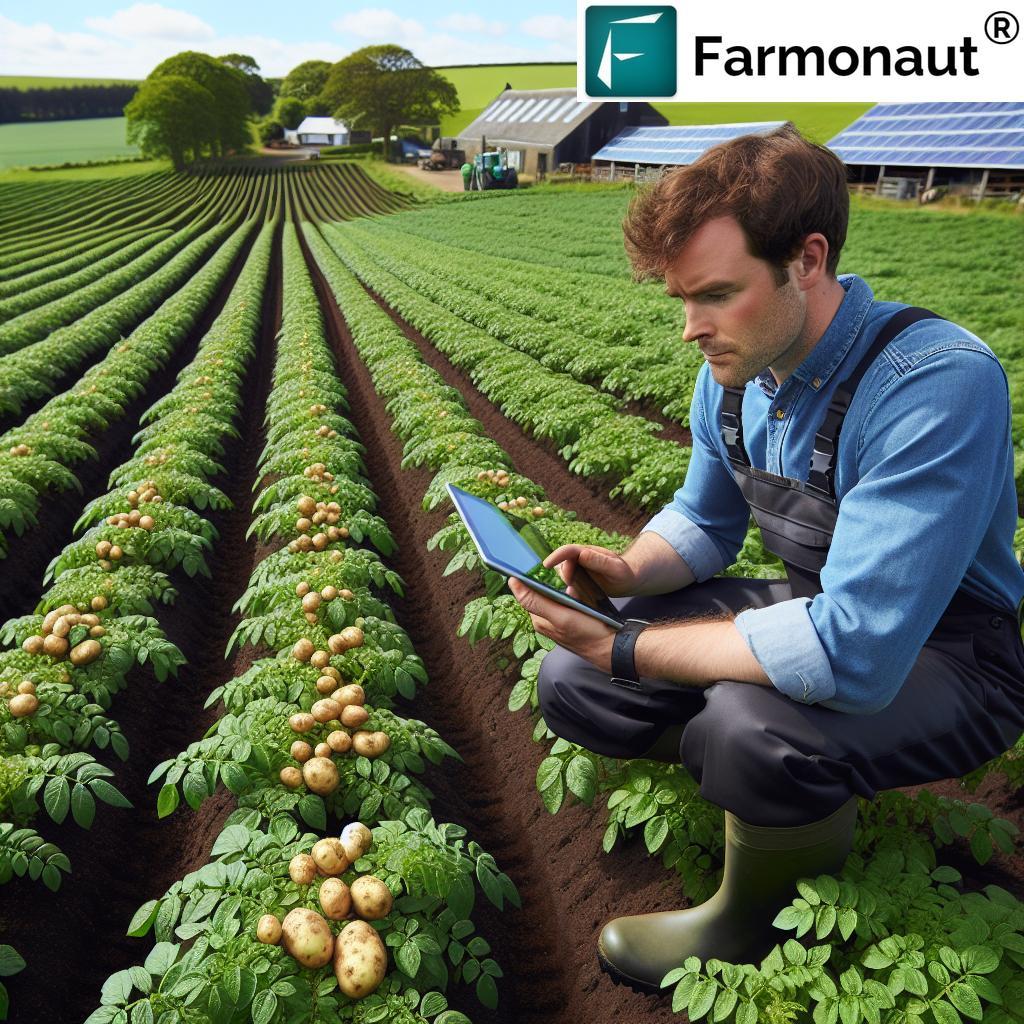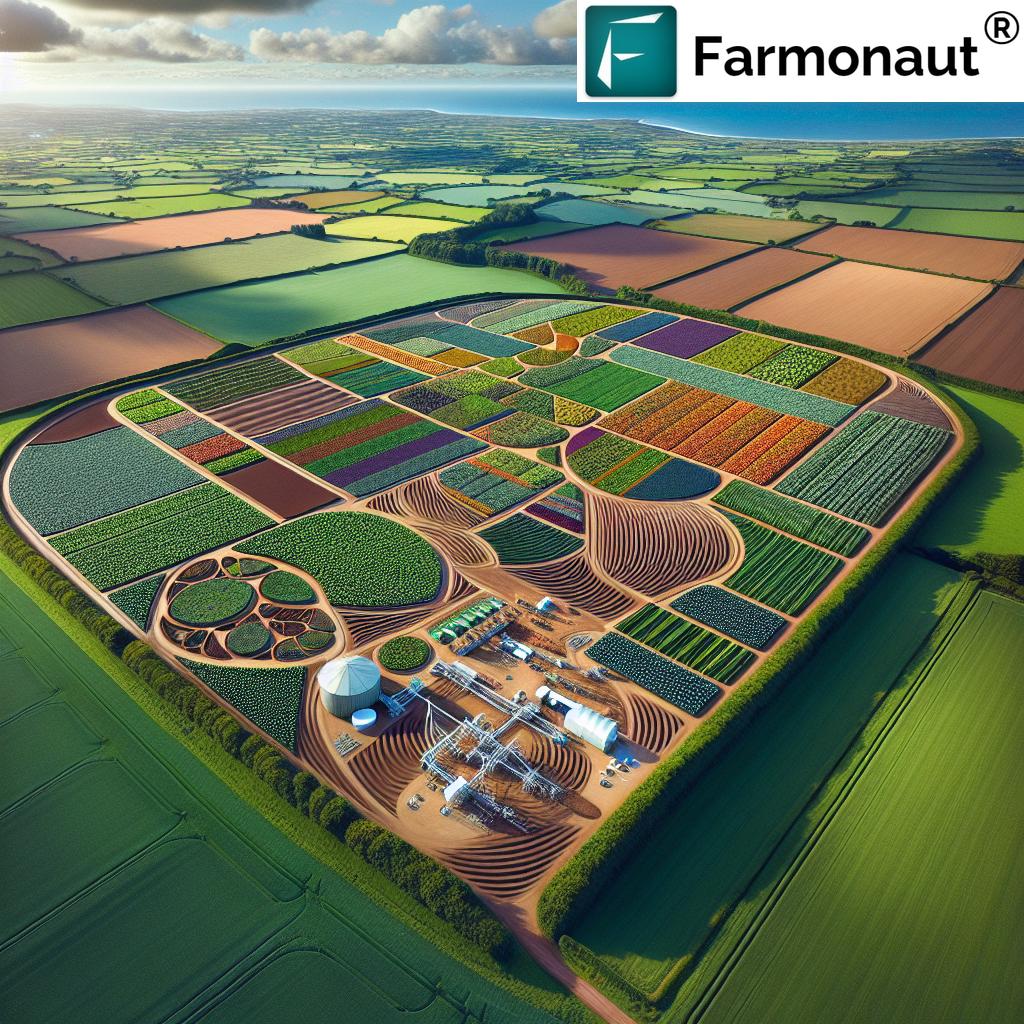Revolutionizing UK Potato Farming: Sustainable Practices for Climate Resilience and Financial Stability
“50% of UK farmers have reconsidered their future in agriculture due to rising costs and environmental threats.”
In the face of unprecedented challenges, we at Farmonaut recognize the critical need for innovative solutions in UK agriculture. The potato farming sector, a cornerstone of British agriculture, is at a crossroads. With financial pressures mounting and climate change impacts intensifying, farmers are seeking sustainable practices that ensure both climate resilience and financial stability. In this comprehensive guide, we’ll explore the transformative measures being implemented to revolutionize UK potato farming and secure a sustainable future for British agriculture.

The Current State of UK Potato Farming
UK potato farmers are facing a perfect storm of challenges:
- Financial Pressures: Rising energy and fertilizer costs are squeezing profit margins.
- Environmental Threats: Extreme weather events, from floods to droughts, are becoming more frequent.
- Market Volatility: Fluctuating demand and prices create uncertainty for growers.
- Sustainability Concerns: There’s a growing need for environmentally friendly farming practices.
These factors have led to a crisis of confidence in the sector, with half of UK farmers reconsidering their future in agriculture. However, amidst these challenges, there’s a beacon of hope. Major industry players are stepping up to support farmers and drive innovation in sustainable farming practices.
The £30 Million Investment: A Game-Changer for UK Potato Farming
“A major potato product manufacturer is investing £30 million to support sustainable farming practices in the UK.”
In a groundbreaking move, a leading potato product manufacturer has announced a £30 million investment to support its network of growers. This substantial commitment is set to transform the landscape of UK potato farming over the next three years. The investment focuses on several key areas:
- Sustainable Farming Practices: Promoting and implementing eco-friendly cultivation methods.
- Regenerative Agriculture: Transitioning to practices that improve soil health and biodiversity.
- Technology Adoption: Testing and implementing new technologies to enhance farm efficiency.
- Demonstration Farms: Establishing model farms to showcase best practices in sustainable potato cultivation.
This investment is not just about financial support; it’s a comprehensive approach to ensure the long-term viability of UK potato farming. By addressing both immediate financial pressures and long-term sustainability concerns, the initiative aims to create a resilient and thriving agricultural sector.
Regenerative Agriculture: The Future of Potato Farming
At the heart of this agricultural revolution is the concept of regenerative agriculture. This approach goes beyond sustainability; it aims to actively improve the environment while producing food. For potato farmers, regenerative practices offer numerous benefits:
- Soil Health: Enhancing soil structure, fertility, and water retention capacity.
- Biodiversity: Promoting diverse ecosystems that support natural pest control.
- Carbon Sequestration: Reducing greenhouse gas emissions and capturing carbon in the soil.
- Water Management: Improving water use efficiency and reducing runoff.
- Resilience: Creating farms that are better equipped to withstand climate extremes.
The transition to regenerative agriculture is not just an environmental imperative; it’s also a smart business decision. By reducing input costs and improving crop resilience, these practices can help farmers weather financial storms and build more profitable enterprises.
Implementing Sustainable Practices in Potato Farming
The shift towards sustainable and regenerative potato farming involves several key practices:
- Cover Cropping: Planting cover crops between potato rotations to improve soil health and prevent erosion.
- Reduced Tillage: Minimizing soil disturbance to preserve soil structure and microbial life.
- Integrated Pest Management: Using natural predators and targeted interventions to control pests.
- Precision Agriculture: Employing technology to optimize resource use and reduce waste.
- Water Conservation: Implementing efficient irrigation systems and water management strategies.
These practices not only benefit the environment but also contribute to the financial stability of farms by reducing input costs and improving yields over time.
The Role of Technology in Sustainable Potato Farming
Technology plays a crucial role in the transition to sustainable potato farming. Advanced tools and platforms are enabling farmers to make data-driven decisions and optimize their operations. At Farmonaut, we’re proud to be at the forefront of this technological revolution in agriculture.
Our satellite-based farm management solutions offer potato farmers unprecedented insights into their crops and land. Through our  , farmers can access real-time data on crop health, soil moisture, and other critical metrics.
, farmers can access real-time data on crop health, soil moisture, and other critical metrics.
Key features of our technology include:
- Satellite-Based Crop Health Monitoring: Real-time insights into vegetation health and soil moisture levels.
- AI-Driven Advisory System: Personalized recommendations for crop management and resource optimization.
- Blockchain-Based Traceability: Ensuring transparency and trust in the potato supply chain.
- Carbon Footprint Tracking: Helping farmers monitor and reduce their environmental impact.
By leveraging these technologies, potato farmers can make more informed decisions, reduce resource waste, and improve their overall productivity and sustainability.
Financial Stability Through Sustainable Practices
One of the most significant challenges facing UK potato farmers is financial pressure. The transition to sustainable practices, while requiring initial investment, can lead to long-term financial stability. Here’s how:
- Reduced Input Costs: Sustainable practices often require fewer chemical inputs, lowering overall expenses.
- Improved Soil Health: Healthier soils lead to better yields and more resilient crops.
- Diversified Income Streams: Regenerative practices can open up new revenue opportunities, such as carbon credits.
- Risk Mitigation: Sustainable farms are better equipped to handle climate-related challenges, reducing crop loss risks.
- Premium Markets: Sustainably grown potatoes may command higher prices in certain markets.
By adopting these practices, potato farmers can build more resilient and profitable businesses that are better positioned to weather economic and environmental challenges.
Comparison: Traditional vs. Regenerative Potato Farming Practices
| Farming Aspect | Traditional Methods | Regenerative Practices | Environmental Impact | Financial Impact |
|---|---|---|---|---|
| Soil Health | Heavy tillage, synthetic fertilizers | Minimal tillage, cover crops, organic amendments | Improved soil structure, increased biodiversity | Reduced fertilizer costs, improved yield stability |
| Water Usage | Conventional irrigation systems | Precision irrigation, water conservation techniques | Reduced water consumption, less runoff | Lower water costs, improved drought resilience |
| Pest Management | Chemical pesticides | Integrated Pest Management (IPM), biological controls | Reduced chemical pollution, increased beneficial insects | Lower pesticide costs, potential premium pricing |
| Crop Rotation | Limited rotation | Diverse crop rotation including cover crops | Improved soil health, reduced pest pressure | Diversified income streams, reduced risk |
| Carbon Footprint | High emissions from inputs and tillage | Carbon sequestration through soil building practices | Reduced greenhouse gas emissions, carbon capture | Potential carbon credit income, lower input costs |
This comparison clearly illustrates the multifaceted benefits of transitioning to regenerative potato farming practices. While traditional methods have served farmers well in the past, the shift towards regenerative agriculture offers a pathway to both environmental sustainability and financial resilience.
The Role of Farmonaut in Supporting UK Potato Farmers
At Farmonaut, we’re committed to supporting UK potato farmers in their transition to sustainable and regenerative practices. Our technology platform offers a range of tools designed specifically for the challenges faced by potato growers:
- Crop Health Monitoring: Our satellite-based monitoring system provides real-time insights into potato crop health, allowing for early detection of issues and timely interventions.
- Soil Moisture Analysis: Optimize irrigation and reduce water waste with accurate soil moisture data.
- Weather Forecasting: Make informed decisions about planting, harvesting, and pest management with localized weather predictions.
- Yield Prediction: Use AI-driven models to estimate potato yields and plan accordingly.
- Carbon Footprint Tracking: Monitor and reduce your farm’s environmental impact, potentially accessing carbon credit markets.
Our solutions are accessible through various platforms to suit different farmer needs:
For developers and agribusinesses looking to integrate our data into their systems, we offer a robust API. Detailed documentation is available in our API Developer Docs.
Case Study: Implementing Sustainable Practices in UK Potato Farming
To illustrate the potential of sustainable potato farming, let’s consider a hypothetical case study based on typical UK farm conditions:
Farm Profile:
- Location: East Anglia, UK
- Size: 200 hectares
- Main Crop: Potatoes (100 hectares)
- Traditional Practices: Conventional tillage, synthetic fertilizers, standard irrigation
Transition to Sustainable Practices:
- Implemented cover cropping between potato rotations
- Adopted minimal tillage techniques
- Installed precision irrigation system
- Integrated Farmonaut’s satellite monitoring and AI advisory system
Results After 3 Years:
- 20% reduction in fertilizer use
- 15% decrease in water consumption
- 10% increase in potato yield
- 30% improvement in soil organic matter
- 25% reduction in overall carbon footprint
This case study demonstrates the potential for significant improvements in both environmental sustainability and farm profitability through the adoption of regenerative practices and advanced technology.

The Future of UK Potato Farming
As we look to the future, it’s clear that the UK potato farming sector is on the cusp of a significant transformation. The combination of sustainable farming practices, technological innovation, and industry support is paving the way for a more resilient and profitable future. Key trends we expect to see include:
- Widespread Adoption of Regenerative Practices: More farms transitioning to sustainable methods as benefits become clear.
- Increased Use of Precision Agriculture: Greater reliance on data-driven decision-making in all aspects of potato farming.
- Diversification of Potato Varieties: Growing focus on climate-resilient and disease-resistant potato varieties.
- Carbon Markets: Potential for potato farmers to participate in carbon credit schemes.
- Consumer-Driven Sustainability: Increasing demand for sustainably grown potatoes influencing farming practices.
At Farmonaut, we’re committed to being at the forefront of this agricultural revolution, providing UK potato farmers with the tools and insights they need to thrive in this changing landscape.
Conclusion: A Sustainable Path Forward for UK Potato Farming
The challenges facing UK potato farmers are significant, but so are the opportunities for positive change. By embracing sustainable farming practices, leveraging advanced technologies, and tapping into support from industry leaders, potato growers can build more resilient, profitable, and environmentally friendly operations.
The £30 million investment from a major industry player marks a turning point, signaling a commitment to the long-term viability of UK potato farming. As we move forward, the integration of regenerative agriculture principles, coupled with cutting-edge technologies like those offered by Farmonaut, will be crucial in ensuring both climate resilience and financial stability for farmers.
We invite UK potato farmers to explore how Farmonaut’s solutions can support their transition to more sustainable practices. Together, we can revolutionize UK potato farming and secure a thriving future for this vital sector of British agriculture.
Ready to start your journey towards sustainable potato farming? Explore Farmonaut’s solutions today:
Frequently Asked Questions (FAQ)
- What are the main challenges facing UK potato farmers today?
UK potato farmers are grappling with rising input costs, extreme weather events due to climate change, market volatility, and the need to adopt more sustainable practices. - How can regenerative agriculture benefit potato farming?
Regenerative agriculture can improve soil health, increase biodiversity, enhance water retention, reduce input costs, and make farms more resilient to climate extremes. - What technologies are available to support sustainable potato farming?
Technologies include satellite-based crop monitoring, AI-driven advisory systems, precision irrigation, and blockchain-based traceability solutions. - How can potato farmers improve their financial stability while adopting sustainable practices?
By reducing input costs, improving yields through better soil health, diversifying income streams, and potentially accessing premium markets for sustainably grown potatoes. - What role does Farmonaut play in supporting UK potato farmers?
Farmonaut provides advanced satellite-based farm management solutions, offering real-time insights into crop health, soil moisture, and other critical metrics to help farmers make informed decisions and optimize their operations.
Earn With Farmonaut: Affiliate Program
Earn 20% recurring commission with Farmonaut’s affiliate program by sharing your promo code and helping farmers save 10%. Onboard 10 Elite farmers monthly to earn a minimum of $148,000 annually—start now and grow your income!






